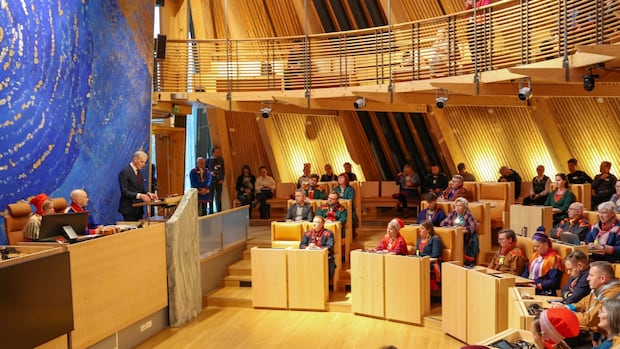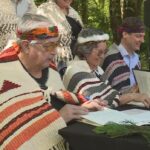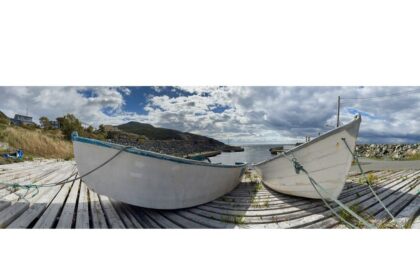WorldAn election to Norway’s Sámi Parliament this week returned major gains for a party opposed to land rights and other special privileges for the Indigenous group.Nearly a third of Sámi voters backed NKF Party, which opposes special status for Indigenous groupJohn Last · for CBC News · Posted: Sep 12, 2025 4:00 AM EDT | Last Updated: September 12Norwegian Prime Minister Jonas Gahr Støre addresses the Sámi Parliament in Karasjok, northeastern Norway on March 9, 2023. The Sámi parliamentary election this week saw major gains for a party opposed to land rights and other special privileges for the Indigenous group. (Jan Langhaug/NTB/AFP/Getty Images)An election to Norway’s Sámi Parliament this week returned major gains for a party opposed to land rights and other special privileges for the Indigenous group.The North Calotte People’s Party (NKF) ran on a platform of “equality” for Norwegians and Sámi, as well as for members of the Kven Finnish minority, in their Arctic homeland.”For centuries, the Arctic Cap has been a melting pot of Sámi, Kvens, Finns, Norwegians and others,” the NKF’s platform reads. “Equality means that everyone should have the same opportunities and rights, regardless of where they live, what language they speak or what culture they belong to.”The party secured a record 15 seats and nearly one-third of the vote on Monday, coming second only to the Norwegian Sámi Association (NSR), Norway’s oldest Sámi party, which has held power since 2009. Neither party now commands a majority in the parliament.Opposition to Indigenous vetoThe NKF has been vocal in resisting efforts by Sámi leadership to enshrine in law the principle of free, prior and informed consent over developments in Sápmi, their Arctic homeland.It has backed controversial energy and mining projects in the North that promise jobs for shrinking coastal communities, but which opponents say will disrupt reindeer herds and poison traditional lands and waters.The party has also strongly objected to efforts to expose so-called “fake Sámi” — voters and politicians who do not meet the criteria for eligibility in elections: identifying as Sámi and claiming a Sámi language-speaking ancestor.”No S�ámi should have to prove or be investigated for their Sámi identity,” its platform reads.But the emergence of high-profile cases — including a former minister responsible for reindeer herding policy — has led to concern among some Sámi leaders that non-Sámi are infiltrating Indigenous institutions in order to undermine and dismantle them.In Finland, these fears spawned a decades-long campaign to reform that country’s election law and more closely scrutinize voters’ ties to living Sámi communities.In Norway, however, proposals to carry out an anonymous survey of voters on their claims to Sámi identity were stymied by the NKF, who told their backers to boycott the project, calling it “modern skull measurement” — a reference to racist 19th-century experiments on Sámi communities.Sámi campaigners sit in front of the Royal Castle during the last day of action in a protest against wind turbines built on land traditionally used to herd reindeer in Oslo, Norway, on March 3, 2023. (Alf Simensen/NTB/AFP/Getty Images)’Sámi society has changed’Toril Bakken Kåven, who founded the NKF in 2009, told CBC News the party’s policies are aimed at overcoming a “national romantic view” of Sámi as reindeer herders only.”What we say is that the Sámi people — all the Sámi people, not just the reindeer herders — should be part of decision making,” she said.But its critics in the NSR say the party has “honed the art of attacking the rights of the Sámi and portraying it as a project of equality.”Anne Henriette Nilut, a political advisor and campaign manager for the NSR, said the election result indicates a deep polarization taking root in Sámi society, and alienation among those Sámi less connected to traditional culture.”There’s been a shift in Sámi politics,” she told CBC News. “The NKF have managed to set word to a feeling that a lot of Sámi have, of not being good enough for the community.”Sámi in Norway were subjected to brutal policies of forced assimilation over the course of several centuries, similar to those inflicted on Indigenous populations in Canada. The NKF draws its support from many of those regions where assimilation had its greatest impact.Kåven says her party’s success is proof that the Sámi “are more than one thing.””We have to accept that the Norwegianization happened,” she said. “And that is very hard … to recognize — that Sámi society has changed.”The NSR will now lead talks to form a coalition government. It’s expected they will have the support to win the assembly’s vote for its new president — putting the NKF, for now, in opposition once again.ABOUT THE AUTHORJohn Last is a freelance reporter and producer currently based in Padua, Italy. He previously reported from Yellowknife, covering Northern Canada and the Arctic. His reporting work has taken him through Europe, the Middle East and the American South.Follow John on Twitter
Friday, 6 Feb 2026
Canada – The Illusion
Search
Have an existing account?
Sign In
© 2022 Foxiz News Network. Ruby Design Company. All Rights Reserved.
You May also Like
- More News:
- history
- Standing Bear Network
- John Gonzalez
- ᐊᔭᐦᑊ ayahp — It happened
- Creation
- Beneath the Water
- Olympic gold medal
- Jim Thorpe
- type O blood
- the bringer of life
- Raven
- Wás’agi
- NoiseCat
- 'Sugarcane'
- The rivers still sing
- ᑲᓂᐸᐏᐟ ᒪᐢᑿ
- ᐅᑳᐤ okâw — We remember
- ᐊᓂᓈᐯᐃᐧᐣ aninâpêwin — Truth
- This is what it means to be human.
- Nokoma











